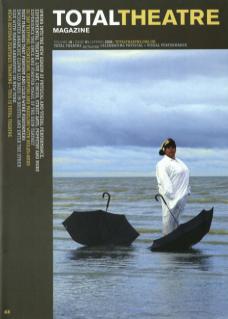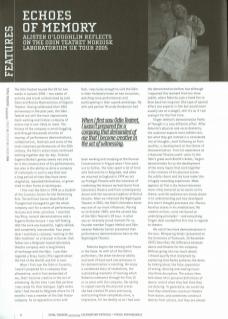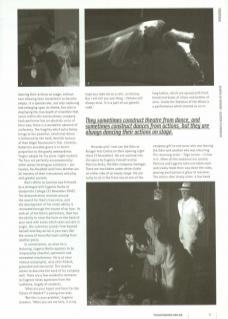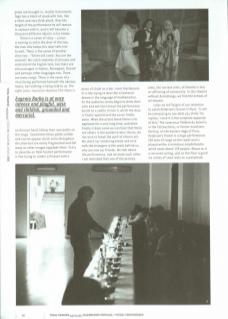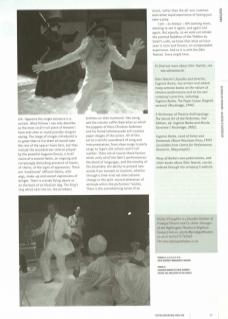The Odin Teatret toured the UK for two weeks in autumn 2005 – two weeks of activity and travel orchestrated by John Dean and Bianca Mastrominico of Organic Theatre. Having celebrated their 40th anniversary in the past year, the Odin Teatret are still the most impressively hard-working and tireless company of actors one is ever likely to meet. The history of the company is mind-boggling and through thousands of miles of touring, of performance demonstrations, collaborations, festivals and some of the most important performances of the 20th Century, the Odin's actors have continued working together day-by-day. Director Eugenio Barba's genius seems not only to be in the construction of his performances, but also in the ability to drive a company of individuals in such a way that over a long period of time they have never stagnated, repeated themselves, or grown tired in their forms or techniques.
I first met the Odin in 1994 as a student of the Coventry Centre for the Performing Arts. The brilliant Carran Waterfield of Triangle had managed to get the whole company over for a series of performances, lectures and other activities. I watched Itsy Bitsy, several demonstrations and a Eugenio Barba lecture. I was left feeling that the work was beautiful, highly skilled, and completely inaccessible. Four years later I watched a company 'working in the Odin tradition' at a festival in Dorset. Dah Teatar are a Belgrade-based laboratory theatre company with a long history of exchange with the Odin. I saw their Legenda u kraju Sveta (The Legend about the End of the World) and fell in love.
When I first saw the Odin in Coventry, I wasn't prepared for a company that allowed me, and in fact demanded of me, that I become creative in the act of witnessing. By the time I saw Dah perform I was ready for that dialogue. Eight weeks later I had moved to Belgrade where for 18 months I was a member of the Dah Teatar company. As an apprentice actor with Dah, I was lucky enough to visit the Odin in their Holstebro home on two occasions, watching more performances and participating in their superb workshops. My wife and partner Miranda Henderson had been working and studying at the Duncan Conservatoire in Prague when I first went out to Serbia. She later spent a lot of time with Dah and me in Belgrade, and when we returned to England in 1999 we set up Prodigal Theatre with the intention of combining the lessons we had learnt from laboratory theatre and from contemporary dance with the narrative tradition of British theatre. When we inherited the Nightingale Theatre in 2003, the Odin's Holstebro home was one of our main influences. Moving on to October 2005, and the second day of the Odin Teatret's UK tour: in what was an intensely proud moment for us, founder member Torgeir Wethal and Odin veteran Roberta Carreri presented their performance demonstrations here at the Nightingale Theatre.
Roberta begins the evening with Traces in the Snow. As with all of the Odin's performers, the sheer technical ability and level of hard work one witnesses in her demonstration is startling. We enjoy a condensed diary of revelations, the outstanding moments of learning which Roberta underwent through her first fifteen or so years with the company. Her ability to repeat exactly the physical scores she had created twenty years previously, and to bring them completely alive, is impressive, for me doubly so as I had seen the demonstration before; but although I expected this moment from her show Judith, where Roberta uses a hand fan to blow back her long hair (the type of special effect one expects in film but would never usually see on a stage), still it's as if I am seeing it for the first time.
Torgeir Wethal's demonstration Paths of Thought is a very different affair. After Roberta's physical and vocal dexterity, the audience expects more athleticism, but what they get instead is a considered line of thoughts, each following on from another, a development on the theme of characterisation. From his experience as a National Theatre youth-actor to the Odin's great work Brecht's Ashes, Torgeir demonstrates for us the development of the many layers that work together in the creation of his physical scores. His subtle charm and dry tone make this a hugely rewarding experience. What appears at first a dry lecture becomes more richly textured as he warms to his theme, and the audience are slowly drawn in to understanding just how developed this man's thought processes are. Marcus Aurelius states in his meditations, 'No random actions, none not based on underlying principles' – and everything Torgeir does exemplifies this line in regards to theatre.
We catch two more demonstrations in the tour. Whispering Winds (presented at the University of Plymouth, 25 November 2005) describes the difference between dance and theatre for the company. Without going into too much detail, I should qualify that statement by explaining that Barba prefaces the demo by talking about the false separation of acting, dancing and making music into three disciplines. The actors then talk about their personal definitions of dance, and of when they feel that they are dancing. To generalise, we could say that they sometimes construct theatre from dance, and sometimes construct dances from actions, but they are always dancing their actions on stage, without ever allowing their movements to become empty. It is spectacular, not only capturing and enlarging upon its theme, but also in displaying the true depth of ensemble that exists within this extraordinary company. Each performer has an absolute voice of their own; there is a wonderful absence of uniformity. The fragility which Julia Varley brings to her powerful, emotional dance is balanced by the hard, devilish humour of Iben Nagel Rasmussen's fool. Likewise, Roberta's enviable grace is in direct proportion to the gawky awkwardness Torgeir adopts for his prom-night student. The four are perfectly accompanied by other actors forming an orchestra – Jan Ferslev, Kai Bredholt and Frans Winther are all masters of their instruments and play with gleeful warmth.
Iben's White as Jasmine was followed by a dialogue with Eugenio Barba at Goldsmiths College (31 November 2005). The demonstration revolves around the search for Iben's true voice, and the development of her vocal ability is recreated through the course of an hour. As with all of the Odin's performers, Iben has the ability to raise the hairs on the back of your neck with tones which seem ancient in origin. She summons sounds from beyond herself and they arrive in your ears like the voices of mournful souls calling from another place.
In conversation, as when he is lecturing, Eugenio Barba appears to be irrepressibly cheerful, optimistic and somewhat mischievous. He is at once intense and playful, wise and childish, grounded and mercurial. This duality seems to describe the work of his company well. There are a few wonderful moments as Eugenio takes questions from the audience, largely of students.
'What are your hopes and fears for the future of theatre?' A young man asks.
‘But this is your problem,' Eugenio answers. 'When you see me here, it is my hope you take me as a relic, as history. But I will tell you one thing – theatre will always exist. It is a part of our genetic code.’
Miranda and I next see the Odin at Alsager Arts Centre on their opening night there (3 November). We are ushered into the space by Eugenio himself and by Patricia Alves, the Odin company manager. There are two tables under white cloths on either side of an empty stage. We are lucky to sit in the front row at one of the long tables, which are spread with fresh bread and bowls of olives and bottles of wine. Inside the Skeleton of the Whale is a performance which started as an in-company gift to one actor who was leaving the Odin and another who was returning. The returning actor – Tage Larsen – is now in it. When all the audience are seated, Patricia and Eugenio take one table each and slowly make their way down the sides, pouring each person a glass of red wine. The actors then slowly enter. A few hand props are brought in, mostly instruments. Tage has a block of wood with him, like a short and very thick plank. Over the length of the performance he will remain in contact with it, and it will become a thousand different objects in his hands.
There is a sense of story – a man is waiting to enter the door of the law; the man who keeps this door tells him to wait. There is the sense of another story too – 'Seven will come. You are the seventh.' We catch snatches of phrases and understand the English text, but there are also passages in Italian, Norwegian, Danish and perhaps other languages too. There are many songs. There is the sense of a ritual being performed beneath the obvious layers, but nothing is being told to us. The eight actor-musician-dancers (for there is no division here) follow their own paths on the stage. Sometimes these paths collide and stories appear which echo throughout the show but are easily fragmented and fall away as other images supplant them. To try to describe an Odin Teatret performance is like trying to render a Picasso with a piece of chalk on a bar-room blackboard. It is like trying to describe a fantastic dream in the language of mathematics. As the audience slowly begin to drink their wine and eat their bread the performance builds to a subtle climax in which the door is finally opened and the seven finally enter. When the actors leave there is no applause for a very long time, and when finally it does come we can hear that there are others in the audience who, like us, do not wish to break the spell of silence yet. We share our remaining bread and wine with the strangers in the seats behind us, who are now our friends. We talk about the performance, and we meet each other. I am reminded that one of the primary aims, the ancient aims, of theatre is this re-affirming of community. In this theatre without dramaturgy, we find the echoes of all theatre.
Later we tell Torgeir of our intention to catch Andersen's Dream in Paris. 'It will be interesting to see what you think, he replies, since it is the complete opposite of this.' The cavernous Théâtre du Soleil is in the Cartoucherie, or former munitions factory, on the eastern edge of Paris. Andersen's Dream is a huge performance (40 tons of cargo on the road) and is played within a miniature amphitheatre which seats about 120 people. Above us is a mirrored ceiling, and on the floor a good six inches of snow rests on a parachute silk. Opposite the single entrance is a curtain. What follows I can only describe as the most rock 'n' roll piece of theatre I have ever seen or could possibly imagine seeing. The range of images introduced is so great that to list them all would take the rest of the space I have here, but they include the wounded war veteran played by the powerful Augusto Omulu, a brief vision of a second Helen, an ongoing and increasingly disturbing presence of slaves, of chains, of the signs of oppression. There are 'traditional’ affluent Danes, with wigs, make-up and vacant expressions of delight. There is a bride flying above us on the back of an Alsatian dog. The King's ship which sails the air, the acrobatic brothers on their hammock-like swing, and the sinister coffin/bed/altar on which the puppets of Hans Christian Andersen and his friend Scheherazade will cremate paper images of the actors. All of this set to a terrific soundtrack of song and instrumentation, from slave songs to party songs to Tage's old-school rock 'n' roll number. There are of course those factors which unify all of the Odin's performances: the blend of languages, and the totality of the ensemble; the ability to present new worlds from moment to moment, whether through a time-trial set and costume change or the split-second alteration of attitude within the performers' bodies. There is the overwhelming sense of an event, rather than the all-too-common and rather tepid experience of having just seen a play.
I am – as always – left wanting more, wanting to see it again, and again and again. But equally, as we walk out amidst the painted Buddhas of the Théâtre du Soleil's café, we know that what we have seen is once and forever; an unrepeatable experience. And so it is with the Odin Teatret. Every single time.
To find out more about Odin Teatret, see: www.odinteatret.dk
Odin Teatret's founder and director, Eugenio Barba, has written and edited many seminal books on the nature of theatre/performance and on his own company's practice, including: Eugenio Barba, The Paper Canoe (English version) (Routledge, 1994); A Dictionary of Theatre Anthropology: The Secret Art of the Performer, 2nd Edition, ed. Eugenio Barba and Nicola Savarese (Routledge, 2005); Eugenio Barba, Land of Ashes and Diamonds (Black Mountain Press, 1999) (available from Centre for Performance Research, Aberystwyth).
Many of Barba's own publications, and other books about Odin Teatret, can be ordered through the company's website.
Alister O'Loughlin is a founder member of Prodigal Theatre and Co-Actor-Manager of the Nightingale Theatre in Brighton. Contact him on: alister@prodigaltheatre.co.uk or tel 01273 702563. See www.nightingaletheatre.co.uk
